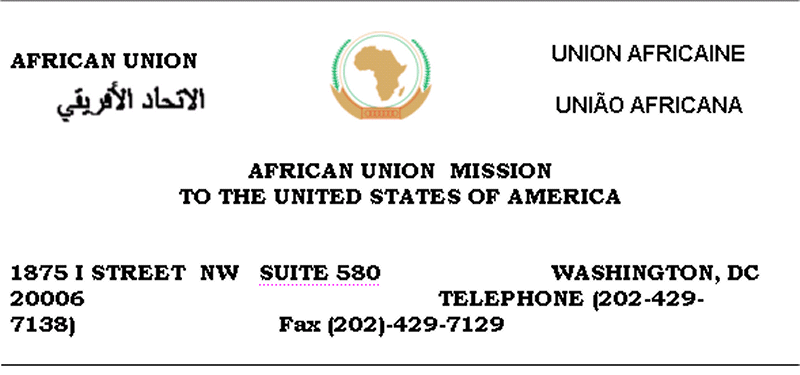HOUSE COMMITTEE ON FOREIGN AFFAIRS
SUB-COMMITTEE ON AFRICA & GLOBAL HEALTH
HEARING ON AFRICA'S WATER CRISIS AND THE U.S. RESPONSE
WEDNESDAY, MAY 16, 2007
Chairman Payne,
Ladies and Gentlemen,
At the outset, I would like to thank you, Chairman Payne and through you, the Members of the Sub-Committee for providing an opportunity to brief you on the African Union's efforts to address Africa's Water Crisis.
The issue of sustainable water management in Africa is of primary concern and since 2002; various mechanisms and institutional arrangements have been put in place to address water availability and utilization in Africa. Water management is also a crosscutting issue in a number of activities undertaken by the Commission of the African Union.
In the year 2002, an African Council of Minister on Water (AMCOW) was established to focus attention on water management in Africa. AMCOW provides the necessary political leadership, policy direction and advocacy in the use and management of water for social and economic development as well as maintenance of Africa's ecosystems. In order to further enhance AMCOW's policy making capacity at the continental level, the African Union is in the process of making AMCOW a Specialized Technical Committee within the structures of the Commission.
Given the fact that Africa has some 20 to 200 Trans-boundary river/lake basins in the world as revealed by the Economic Commission of Africa in 2002, the African Union is promoting the Transboundary management of the Continent's water resources. At its 2nd Extraordinatry Session of the AU Assembly of Heads of States held in Sirte, Libya in 2004, African Union committed itself to the principle of integrated and sustainable transboundary water management by strengthening existing river and Lake Basin organizations and encouraged the creation of new ones where appropriate.
Guidelines for establishing a cooperative framework agreement for the integrated management of Transboundary basis has already been developed and will be submitted for endorsement by the forth coming 6th Ordinary Session of AMCOW scheduled to be held from 28 to 31 May 2007.
AU Member States and Governments will be encouraged to use these guidelines in fostering collaborative water resources management on the continent.
At the same 2nd Extraordinary Session held under the theme, "Agriculture and Water" the African Water Facility was adopted by the AU Assembly of Heads of State and is currently hosted by the African Development Bank. The goal of the African Water Facility is to contribute to the efforts of reducing poverty and promoting sustainable development in Africa by expanding the continent's capacity to access funding and improve the efficiency of its use. The Facility also aims at achieving this goal within the framework of the earlier adopted Africa Water Vision 2025, its Framework for Action, and NEPAD.
Mr. Chairman,
The Commission of the African Union continues to support the efficient operation of the river and lake basin organizations in Africa. Recently, the Commission in collaboration with the African Network of Basin Organization (ANBO) organized for the first time a meeting of the Chief Executives of the basin organizations with the aim of brining them into a kind of federation under the umbrella ambit of ANBO with a view to developing synergy and cooperation between the basin organizations.
There are also regional programmes and projects focusing on water resources management. The Fouta Djallon Highland Integrated Development project, located in Fouta Djallon, Republic of Guinea, comprises several countries in West Africa that are within the catchments area of the Fouta Djallon. May of the big rivers in that region take their sources from this highland? With funding from Global Environment Facility (GEF) and contributions from national governments, the vast recourses of Fouta Djallon will be managed to promote socio-economic development in the region.
The AU Semi-Arid Food Grain Research and Development (SAFGRAD), located in Ouagadougou, Burkina Faso, promotes water management strategies to increase agriculture productivity and combat desertification.
In collaboration with Regional Economic Communities (REC) and development partners, the Commission, through the Department of Infrastructure and Energy is promoting the development of adequate infrastructure for harnessing the continent's huge water resources potentials for the development of agriculture, energy generation and transportation.
The African Union has developed water management partnerships with the United Nations Economic Commission for Africa (UNECA), the United Nations Environment Programme (UNEP), UN-HABITAT, Water Aid and other international agencies and regional development agencies such as the African Development Bank. It also collaborates with water utility agencies of Member States to promote sustainable water supply and sanitation service delivery in the continent.
Bearing in mind the intrinsic link between Climate and the supply of water, the Assembly of the African Union at its 8th Ordinary Session held earlier this year in January 2007, adopted a Decision which, amongst other things, commits Member States of the Union to promote the development and implementation of adaptation measures to mitigate climate change and further mandated the Commission of the African Union to develop and implement an action plan on Climate and Development in Africa in collaboration with AU Development Partners.
In conclusion, let me also point out that in view of the fact that most of Africa's natural disasters are hydro-meteorologically related, the AU Commission in collaboration with the International Strategy for Disaster Risk Reduction is implementing the African Disaster Risk Reduction Strategy, which aims at increasing the resilience of Africa to adapt and mitigate consequences of disasters including floods and droughts.
I thank you for your attention.
|
NEWSLETTER
|
| Join the GlobalSecurity.org mailing list |
|
|
|


